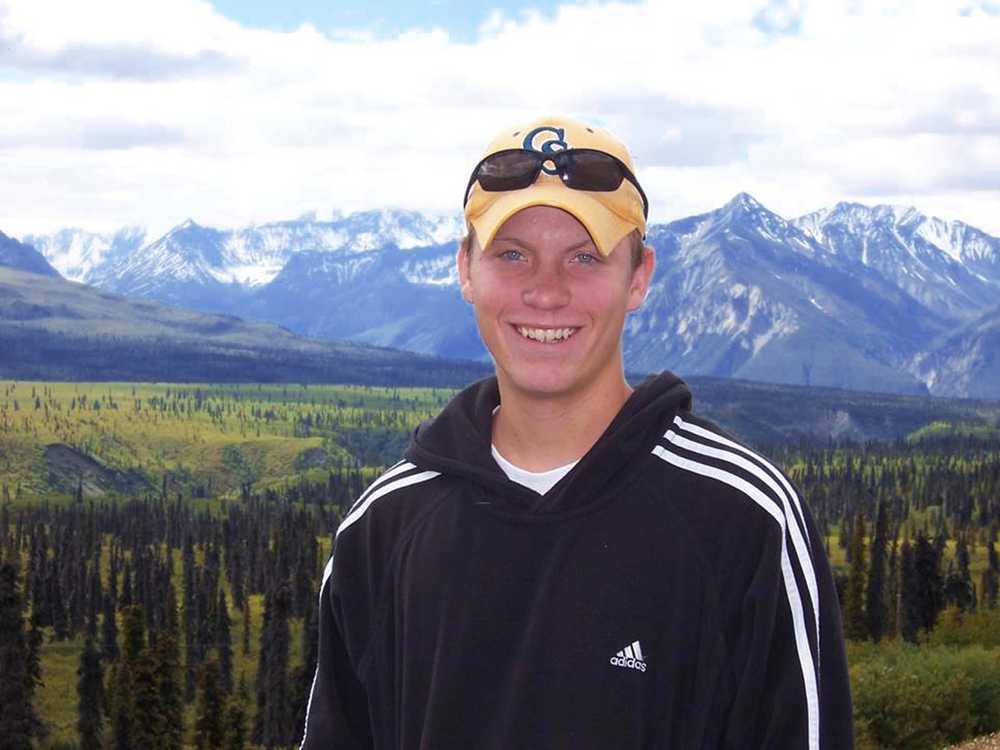Sitting beside her friend, in his power boat on the lower Kenai River near Eagle Rock at 5 a.m. Pegge Erkeneff was again faced with the, for her, weighty question “Do you have any children?”
Her friend lowered his brow into his cupped hands and said to her, “That sucks. I am so sorry.”
It was one of the most honest responses she’s received in the eight years she’s been telling people that Justin Bernecker, her 16-year-old son, died to suicide. Which is the way she prefers to describe it.
“It does suck,” Erkeneff said, now sitting on a bench in Parker Park, a breeze was the only thing cooling off the unusual, late morning heat.
Erkeneff spoke at the Saturday, Walk to Prevent Suicide at the Soldotna Regional Sports Complex that drew 70 community members. It was her first time speaking to a large audience about her experience as a survivor of suicide.
It’s the right time, Erkeneff said. She hopes her words can help others heal. There is no “wrong” when it comes to how people deal with grief, she said.
Erkeneff said she has a tendency to shy from certain socially accepted terminology.
“It drives me nuts when people say ‘I’m sorry you lost your son’,” Erkeneff said. “He’s not lost, he died.”
In the weeks leading up to the Suicide Prevention Walk, Erkeneff said she has had some clarifying moments.
“A trauma happens you can’t comprehend until time passes,” Erkeneff said. “There were times when I barely crawled through life. There were years.” Erkeneff said.
These days Erkeneff has learned to ride out sporadic “tidal waves” of grief.
The term “committed suicide” implies the person was fully conscious of their decisions in the moment they chose to kill themselves.
“Would you say someone committed a heart attack or they committed cancer?” Erkeneff said. “I don’t think so.”
While it remains uncertain, Erkeneff said it is likely her son had a rapid onset of bipolar disorder and schizophrenia. The disease unraveled Justin’s mind in just around a week, she said. The warning signs had trickled in and been pieced together throughout the years.
After Justin killed himself, a friend of his approached Erkeneff and said her son had “jokingly” mentioned he wanted to kill himself. From the friends’ revelation she is now able to advise people to take any comment seriously, no matter what.
What is important in potential intervention is helping someone get through that moment, Erkeneff said. Just keep talking and letting them know the feeling will end.
Erkeneff does not consider Justin’s death the defining moment of her life. She said she knows Justin would have wanted her to laugh, and applying meaning to her experience has allowed her to move forward.
Everyone grieves differently, Erkeneff said.
It is likely everyone will experience the classic five stages of grief, but sometimes they will hit all at once, and sometimes they won’t come out for years, she said.
“Honestly I wouldn’t have signed up for it,” Erkeneff said. “The choice is what to do with it.”
Erkeneff she’s often returned to a phrase she once was told about premature death; that “those who died old came to learn, and those who died young came to teach.”
Years after Justin died, Erkeneff received an email from one of his former classmates he’d met in German class.
“I remember he came home one day and announced he would now be called Dieter,” Erkeneff said laughing. “Ok Dieter. Whatever.”
Erkeneff said she’d never met the girl. She told her she was one of the shiest girls at school, but Justin persisted in getting to know her, even teasing her frequently.
The girl said from her friendship with Justin, she had learned self-respect and to be more open to the people. Justin also taught the girl how to laugh.
Kelly Sullivan can be reached at kelly.sullivan@peninsulaclarion.com

